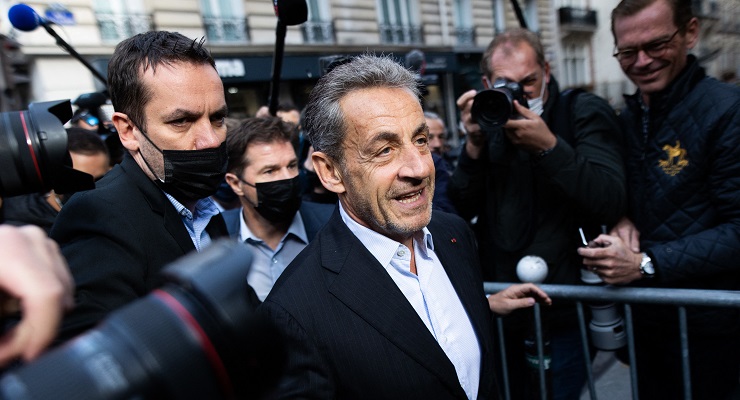
Last week, while Australia was gaping at the sight of a NSW premier resigning over a corruption investigation, the courts in France were handing former president Nicolas Sarkozy his second conviction related to illegal campaign financing — with another case to come.
The Sarkozy charges remind us that investigative journalism gets its scalps by following the famous advice to Watergate’s Bob Woodward and Carl Bernstein: follow the money. But this century, the investigative mantle has been handed on to a global network of journalist-led digital players such as Sarkozy’s bête noire, Mediapart.
The news digital start-up launched in 2008 with what, at the time, was an odd business model: subscription only, advertising free. Now, off the back of the 2020 COVID boost, it reports about 220,000 paying subscribers, second in the country only to Le Monde’s 360,000.
In 2019, it entrenched its independence by turning into a non-profit foundation. That model has since been replicated by struggling post-’68 French daily Libération.
More than a new voice, Mediapart reimagined French journalism, using US- and UK-style investigations to replace the traditional mix of deep analysis and activist campaigns bulked out with commodified news and infotainment. Almost inevitably, this led to Sarkozy, beginning with l’affaire Bettencourt with secret tapes revealing L’Oreal heiress Liliane Bettencourt was making payments to members of Sarkozy’s government. (French media sniff at the Anglo-Saxon “-gate” as the go-to suffix for scandals, preferring the racier “l’affaire”.)
In 2012, Mediapart followed up with reports that Sarkozy’s 2007 presidential campaign had been funded with an illegal and undeclared €50 million from then Libyan head Muammar al-Gaddafi.
That exposure sparked a police investigation which in turn uncovered l’affaire Bismuth from the pseudonym “Paul Bismuth” used by Sarkozy when talking to his lawyer-fixer Thierry Herzog about offering the investigating magistrate a job on the French Riviera in exchange for information about what the investigators knew of his involvement in the Bettencourt payments.
In March, that affaire led to Sarkozy’s three-year sentence for influence-peddling. He has appealed — “an insult to my intelligence”, he huffs.
Last week it was another one-year sentence in l’affaire Bygmalion for overspending in his losing 2012 reelection campaign on large celebrity-style rallies with flag-waving supporters, a campaigning model adopted by the Trump campaign four years later. Sarkozy dismissed it as “an accounting detail” and is appealing that too.
Next up will be charges from l’affaire Gaddafi. Sarkozy says they’re sour grapes from the former Libyan regime over NATO’s role in its overthrow.
Current President Emmanuel Macron has his own issues with Mediapart: les affaires Benalla, where the news site reported that his former deputy chief of staff Alexandre Benalla was travelling on diplomatic passports after having been dismissed for an earlier exposé (by Le Monde) identifying him beating up a demonstrator in 2018. He is currently on trial.
Mediapart then tripled down by revealing that Benalla had become involved with Russian oligarchs while working for Macron.
Mediapart’s offices were broken into in connection with the Bettencourt matter. It blocked an attempted police raid over the Benalla reports. In July it was revealed that the phones of two of its staff were hacked by the Moroccan secret service using the secretive Pegasus malware. It estimates it has been sued for defamation more than 200 times.
As in Australia, French media policy has been more aimed at sustaining old mass media than encouraging new voices. French newspapers have long received government subsidies and, until 2014, drew a 2.1% sales tax, compared with the 19.6% levied on digital sites. Mediapart is fighting claims by the French tax office for back payments at the higher rate.
Earlier this year, the French government helped broker a €20 million payment from Google to metropolitan and regional papers.
In this year’s annual report, founding editor Edwy Plenel hit back at the old mastheads: “Owned by wealthy industrialists, they benefit from handouts of subsidies from the public purse (which have been increased due to the coronavirus pandemic), and of which the most substantial amounts are given to the richest and most powerful among them; just as they also benefit from the funds paid out by the multinationals of the digital world (such as Google, Facebook and Microsoft).” Ouch.
Mediapart is not afraid to run against the French media pack, arguing, for example, that the submarine debacle “should prompt a rethink of France’s global role and an end to the notion of its grandeur and exceptionalism”.








“French media sniff at the Anglo-Saxon “-gate” as the go-to suffix for scandals, preferring the racier “l’affaire”.”
I always thought that the use of the suffix “-gate” for a scandal was ridiculous, as it was merely part of the name of the Watergate complex that it is derived.
The evolution of language is messy, like your grammar.
It’s time our media also followed the money. Wait it can’t it is mostly owned by American money. No hope of independence here look at the hashtag being encouraged by an AMERICAN pretending to be Australian.